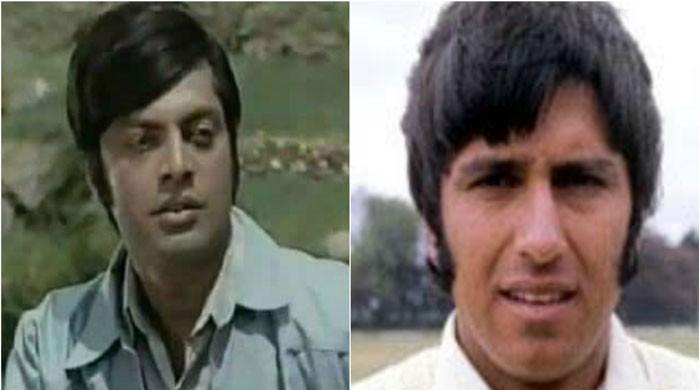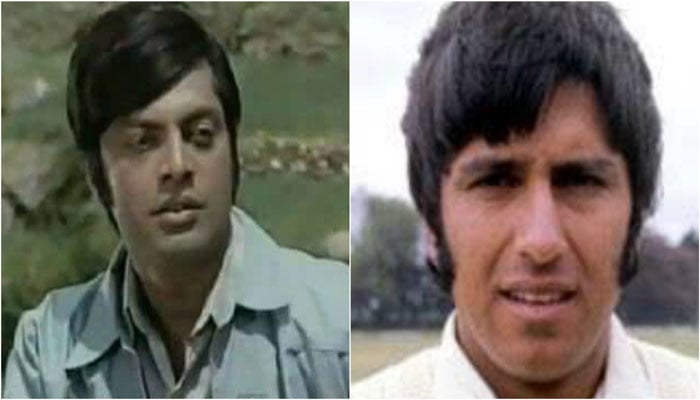

On this day, 35 years ago, Waheed Murad, Pakistan's most iconic movie star left us for the heavenly abode. In a career spanning over 20 years, the versatile actor, producer, director and screenwriter worked in and produced over 120 movies. From the moment he first stepped on to a movie set, Murad had a sudden and stratospheric rise to the top. His larger than life image turned him into a totem for the youth. It was common to see young boys and girls carrying a photograph of him - clean-shaven with gelled back hair — placed between pages of their college coursebooks.
The actor's on-screen presence and persona had chimed with a generation.
When on set, Murad was multi-talented. He would breeze through scenes with flair, whether action-packed, romantic or comedic. In fact his chemistry with the leading ladies of his time, often struck a soar note with their respective spouses, inviting much drama during production.
Born on October 2, 1938, in Sialkot, Murad first forayed into the film fraternity as a producer of Insaan Badalta Hai (1961). At that time, he was only 23-years-old. What helped him land his first job was his father, Nisar Murad, a pre-partition film distributor who was well-connected with the industry. From thereon, the young actor took on a few supporting roles, until 1964 when he scored his first lead in Heera Aur Pathar.
Outside the world of celluloid, Pakistan was stable under the rule of President General Ayub Khan. The same year Murad was making his debut, General Ayub launched the country's first television media broadcasting network, a few weeks before the January 1965 presidential elections, which pitched Ayub Khan against Fatima Jinnah. Separately, legendary comedian and TV celebrity Anwar Maqsood had also emerged on to the scene that year. On the other hand, in sports, Pakistan bagged a silver medal in hockey at the Tokyo Olympics, Aftab Jawaid won the amateur British Open Squash title, and the cricket team had no less than six players inducted to face Australia in Karachi.
But there was another significant development. Silently and without much fanfare, Murad's twin was kicking off his career. Not in movies, no, in sports. Batsman Majid Khan first entered the field of cricket in 1961. With Murad, he shared a zodiac sign, Libra, a meteoric rise, love for English literature and choppy sideburns.
By 1967, Murad was on to his third production, Ehsan, which was running to packed-to-capacity cinemas. The actor had already cemented himself as an icon by then, with ventures like Kaneez, Dever Bhabi, Insaaniyat and Josh. He was also credited for making Pakistan's first platinum jubilee film, Armaan, in 1966.
While his identical, Majid helped Glamorgan lift the cup in the Country Championship match at Colwyn Bay, near Wales, in June 1969, after a gap of 20 years. As the match ended, the 23-year-old sportsperson, who was planning to put cricket behind him, to pursue higher education at Cambridge, heard loud chants of his name emerge from the crowd. Overwhelmed, Majid promised to return to the game after completing his studies.
The early 1970s saw the best of both men. Murad was one of the two actors who could turn any venture into gold. During the same period, Majid Khan earned himself a slot on the Wisden Cricketers of the year. The young batsman's sharp fielding, speed bowling and stylish hits were quickly becoming the talk of the town. He later went off to record Pakistan's first century in a limited overs cricket match in 1973.
And just as their career began together, they took a turn for the worst in harmony as well.
The year was 1979. Murad failed to deliver any hits after his last in 1978, Awaaz, which featured an ensemble cast of Muhammad Ali, Shabnam, Naghma and Ghulam Mohiuddin. The downfall, some say, was due to the arrival of videocassette recorders that had a destructive affect on cinema in the 1970s. Audiences now preferred to stay at home and watch a rented video, for as low as Rs10, rather than take their families out to the local theatre. As for Majid Khan, a bouncer from Andy Roberts struck his left cheekbone and fractured it. After that he kept slipping down the battling order, never returning to the top again. Tragically, he was not able to fulfill his dream of scoring 4,000 runs. After his cousin, Imran Khan, was appointed captain of the cricket team, Majid Khan was further relegated to the shadows. By then he was only short of 69 runs to achieve his target.
Murad died in 1983, while he was working on Hero in Lahore.
It is unlikely that Murad and Majid Khan ever met. It is also unlikely that they ever knew how similar their stories were.
Later, both their sons attempted to emulate the fathers' success but failed. Bazid Khan made his test debut but then settled as a commentator. Similarly, Adil Murad did try his hand with acting but eventually took up production.
thats written by me. credit de dia kartay hain
ReplyDelete